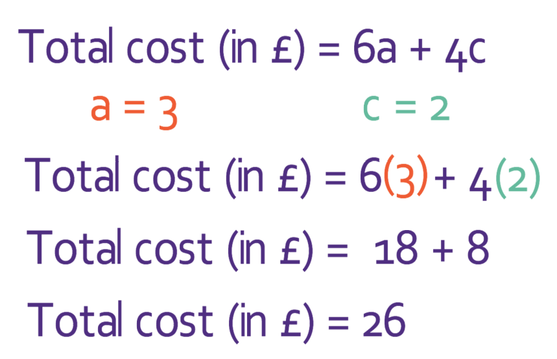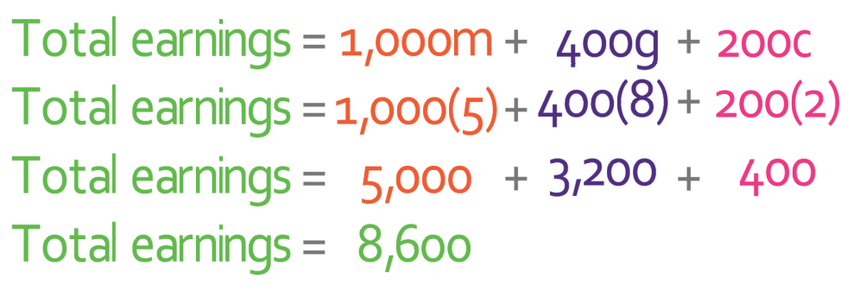Back to OCR Algebraic Formulae (H) Home
2.3 B) Creating Formulas
2.3 B) Creating Formulas
We are able to create formulas for certain situations and we do this by interpreting the information that we are given in a statement/ question.
Example 1
I go to the cinema with some members from my family. An adult’s ticket for the cinema is £6 and a child’s ticket is £4. Write down a formula for the cost of going to the cinema and then work out how much it would cost to go to the cinema if there are 3 adults and 2 children.
The first part of the question is asking us to create a formula for the cost of going to the cinema. The cost of going to the cinema is dependent on the number and type of people going to the cinema. We are told in the question that there are two different types of tickets and ticket prices; an adult’s ticket cost £6 and a child’s ticket cost £4. To work out the cost of going to the cinema, we will be adding the total cost of all of the adult tickets to the total cost of all of the child tickets.
I go to the cinema with some members from my family. An adult’s ticket for the cinema is £6 and a child’s ticket is £4. Write down a formula for the cost of going to the cinema and then work out how much it would cost to go to the cinema if there are 3 adults and 2 children.
The first part of the question is asking us to create a formula for the cost of going to the cinema. The cost of going to the cinema is dependent on the number and type of people going to the cinema. We are told in the question that there are two different types of tickets and ticket prices; an adult’s ticket cost £6 and a child’s ticket cost £4. To work out the cost of going to the cinema, we will be adding the total cost of all of the adult tickets to the total cost of all of the child tickets.
We obtain the total cost of the adult tickets by multiplying the number of adult tickets required by the cost of an adult ticket. In the first part of the question, we are given the cost of an adult’s ticket (£6), but we are not given the number of adult tickets required. The number of adult tickets required is going to be a variable that we change depending on the group going to the cinema. Let’s let a be the number of adult tickets required.
The total cost of the adult tickets is 6a.
We are able to obtain the total cost of the child tickets in a similar way. In the first part of the question, we are told the cost of a child’s ticket, but we are not given the number of child tickets required. The number of child tickets required will vary on the group of individuals that is coming to the cinema. Let’s let the number of child tickets required equal c.
We are able to obtain the total cost of the child tickets in a similar way. In the first part of the question, we are told the cost of a child’s ticket, but we are not given the number of child tickets required. The number of child tickets required will vary on the group of individuals that is coming to the cinema. Let’s let the number of child tickets required equal c.
The total cost of the child tickets is 4c.
We are now able to sub the total cost of adult tickets (6a) and the total cost of child tickets (4c) into the first formula.
We are now able to sub the total cost of adult tickets (6a) and the total cost of child tickets (4c) into the first formula.
The formula above is in pounds.
The second part of the question asks us to find the total cost of 3 adults and 2 children going to the cinema. The variable a was the number of adults, which is 3 for this group (a = 3). The variable c is the number of children, which is 2 for this group (c = 2). Therefore, we sub in a as 3 and c as 2 into the formula above.
The second part of the question asks us to find the total cost of 3 adults and 2 children going to the cinema. The variable a was the number of adults, which is 3 for this group (a = 3). The variable c is the number of children, which is 2 for this group (c = 2). Therefore, we sub in a as 3 and c as 2 into the formula above.
Therefore, the total cost of the group for 3 adults and 2 children going to the cinema is £26.
Example 2
A football player gets paid £1,000 for each match that he plays. He gets an additional £400 for each goal that he scores and £200 for each clean sheet (a clean sheet is where no goals are conceded during a match). Create a formula for the amount of money that our footballer gets paid (remember to say what each variable in the formulae is equal to), and work out how much our footballer gets paid if he plays 5 games, scores 8 goals and has 2 clean sheets.
Let’s first go about creating the formula. The first step to creating a formula is to work out the number of variables that you have. We have four variables in this question:
We are now able to create the formula. There are three different components that contribute to the earnings of our football player; number of matches, number of goals and number of clean sheets.
A football player gets paid £1,000 for each match that he plays. He gets an additional £400 for each goal that he scores and £200 for each clean sheet (a clean sheet is where no goals are conceded during a match). Create a formula for the amount of money that our footballer gets paid (remember to say what each variable in the formulae is equal to), and work out how much our footballer gets paid if he plays 5 games, scores 8 goals and has 2 clean sheets.
Let’s first go about creating the formula. The first step to creating a formula is to work out the number of variables that you have. We have four variables in this question:
- The amount of money that our footballer earns (the variable that we are making the subject of the formula)
- The number of matches that he plays
- The number of goals that he scores
- The number of clean sheets that the team has
We are now able to create the formula. There are three different components that contribute to the earnings of our football player; number of matches, number of goals and number of clean sheets.
In order to work out the formula, we need to give the 4 different variables a letter to represent them. The letters that I am using to represent the 4 variables are given below:
We know that the individual receives £1,000 for each match that he plays. Therefore, his total earnings from matches in pounds is 1,000 multiplied by the number of matches played(m), which is 1,000m (1,000 x m).
For each goal that the player scores, he receive £400. Therefore, the total earnings that the player receives from goals in pounds is 400 multiplied by the number of goals that he scores (g), which is 400g (400 x g).
Finally, for each clean sheet that the team has, the player gets £200. This means that the total earnings from clean sheets in pounds is 200 multiplied by the number of clean sheets (c), which is 200c (200 x c).
We can combine these three different components to get the total amount of money that our player earns in pounds (w). This gives us the formula below.
- Amount of money – w (for wages)
- Number of matches that he plays – m
- Number of goals that he scores – g
- Number of clean sheets that the team has – c
We know that the individual receives £1,000 for each match that he plays. Therefore, his total earnings from matches in pounds is 1,000 multiplied by the number of matches played(m), which is 1,000m (1,000 x m).
For each goal that the player scores, he receive £400. Therefore, the total earnings that the player receives from goals in pounds is 400 multiplied by the number of goals that he scores (g), which is 400g (400 x g).
Finally, for each clean sheet that the team has, the player gets £200. This means that the total earnings from clean sheets in pounds is 200 multiplied by the number of clean sheets (c), which is 200c (200 x c).
We can combine these three different components to get the total amount of money that our player earns in pounds (w). This gives us the formula below.
The second part of the question asks us to work out how much our footballer gets paid if he plays 5 games, scores 8 goals and has 2 clean sheets. We are being asked to work out what w is in the formula above. We are able to find w by subbing in the values for each of the variables. The variable m is the number of matches played, which is 5 (m = 5). The variable g is the number of goals scored, which is 8 (g = 8). And finally, the variable c is the number of clean sheets, which is 2 (c = 2). We can sub the values for m, g and c into the formula.
Our footballer gets paid £8,600.








